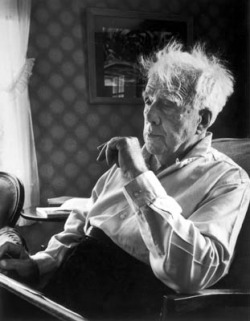Metaphor
a figurative use of language in which a comparison is expressed without the use of a comparative term like “as,” “like,” or “than.” A simile would say, “night is like a black bat”; a metaphor would say, “the black bat night.”
The Road Not Taken
Robert Frost
Two roads diverged in a yellow wood,
And sorry I could not travel both
And be one traveler, long I stood
And looked down one as far as I could
To where it bent in the undergrowth;
Then took the other, as just as fair,
And having perhaps the better claim,
Because it was grassy and wanted wear;
Though as for that the passing there
Had worn them really about the same,
And both that morning equally lay
In leaves no step had trodden black.
Oh, I kept the first for another day!
Yet knowing how way leads on to way,
I doubted if I should ever come back.
I shall be telling this with a sigh
Somewhere ages and ages hence:
Two roads diverged in a wood, and I—
I took the one less traveled by,
And that has made all the difference.
The metaphor in Robert Frost’s poem, “The Road Not Taken”, occurs in the third stanza. “And both that morning equally lay in leaves no step had trodden black”. Frost wrote about not following everyone else, being an individual, and taking the “[road] less traveled by”. “I took the one less traveled by, And that has made all the difference.” By writing that line, Frost leaves the interpretation of what happened to the narrator open. He never writes if taking the “road less traveled by” was a good thing to do, or a bad thing.

"A civilized society is one which tolerates eccentricity to the point of doubtful sanity." ~Robert Frost
Robert Frost

Robert Lee Frost was born in San Francisco on March 26, 1874 to Isabelle Moodie, a Scottish schoolteacher, and William Prescott Frost, Jr., a journalist, local politician and ancestor of Devonshire Frost who had sailed to New Hampshire in 1634.
Frost's family lived in California until his father had died when he was just eleven. He moved with his mother and sister to Lawrence, Massachusetts to live with his paternal grandfather.
In 1892, Frost graduated from high school and attended Dartmouth College and was a member of the Theta Delta Chi fraternity. While attending college, Frost's first poem, "My Butterfly: An Elegy", was published in the New York Independent, which earned him $15, and had five poems published privately in 1894.
In 1895, Frost married a former schoolmate, Elinor White; they had six children. Frost then became a teacher and continued publishing his poems in magazines to support his family. From 1897 to 1899, Frost attended Harvard, but failed to receive a degree. The couple moved to Derry, New Hampshire, where Frost worked as a cobbler, farmer and teacher at Pinkerton Academy and a state normal school in Plymouth.
As the couple grew tired of farm life, they needed a change. Robert wanted to move to Vancouver and Elinor England, so England it was. In 1912 the couple sold their farm and moved to the Gloucestershire village of Dymock, where Robert became a full-time poet. The next year, A Boy's Will was published. The book received international fame and contains many of Frost's best-known poems: Mending Wall, The Death of the Hired Man, Home Burial, After Apple-Picking and The Wood-Pile. While in England, Frost made notable contacts with fellow poets as Ezra Pound (who gave Frost his first favorable review by an American), T.E. Hulme and Edward Thomas.
Frost returned to America in 1915 and bought a farm in Franconia, New Hampshire to farther his career in writing, teaching and lecturing. From 1916 to 1938, Frost worked as an English professor at Amherst College. He encouraged his students to bring the sound of man to their writings. Also in 1916, Frost was made a member of the National Institute of Arts and Letters and published his third collection of verse, Moutain Interval.
In 1920, Frost purchased a farm in South Shaftsbur, Vermont. Robert's wife died in 1938, followed by four of his children. He suffered from long boughts of depression and continual self-doubt. After the death of his wife, he employed Kay Morrison, who he became strongly attracted to. One of his finest love poems, A Witness Tree, was composed for her.
During the inauguration of President John F. Kennedy, Frost recited one of his poems, The Gift Outright. Robert also represented the United States on several other official missions. He became known for his poems that interplay voices, such as The Death of the Hired Man, and received numerous literary and academic honors.
Robert Lee Frost died on January 29, 1963 and is buried in the Old Bennington Cemetery in Bennington, Vermont.
(http://www.poemofquotes.com/robertfrost/)
